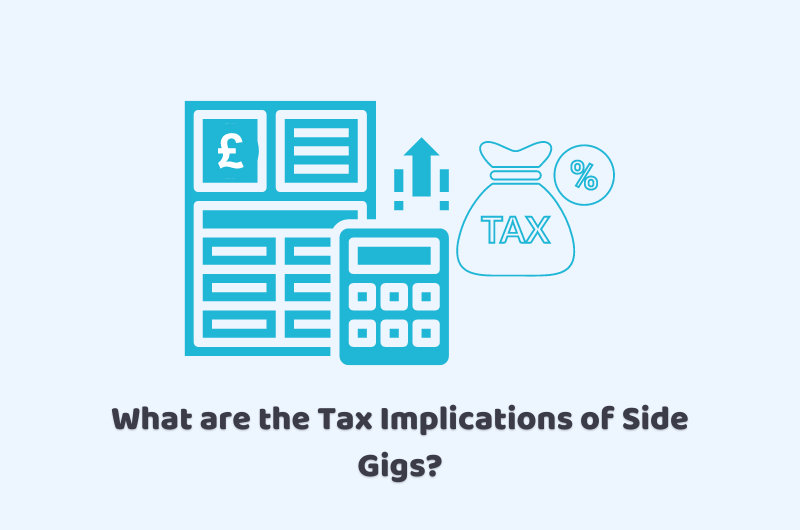
27/09/2022Tax Issues , Tax Saving Tips
This is the era of ideas where people are so smart and full of unique ideas to meet both ends to make a living. People do not rely on one job only and tend to manage a side job along with the management of a full-time job. This is usually to pursue their dreams or to earn extra pounds. Whatever the reason is but the side gigs are way more popular than you expect especially among the residents of the UK. We know this feels so productive to earn extra money from your side gigs but what about the tax implications of side gigs?
Are you aware of the tax liabilities this extra income can bring in for you? Is it worth it to go with it after you realise how beneficial it can get after seeing it tax-wise? Several people are unaware of the fact that there are tax implications for their side gigs too. If you do not get a clear understanding of the tax responsibility of your extra income coming from your side gigs, you will end up being stuck in the unexpected visit from HMRC. To be on the safer side, this guide will help you to understand everything that you need to know about what is side gig, what are the tax implications of side gigs, what is the need to declare the extra income from side gigs, and how tax you will have to pay on this extra earning.
Talk to our best accountants and bookkeepers in the UK at CruseBurke. You will get ensured instant help whether you are running a small business or large.
Side Gig – What is it?
When you are in full-time normal employment, you always have a few dreams to pursue or you still need those extra pounds to make a better living. A side gig is a way out to those dreams or to earn those extra pounds that you have always wished for. A side gig is one of the favourites and most popular ways to manage full-time jobs among the people of the UK. This is known to be a smart idea when you want to make extra money and want to manage your full-time job as well.
As people are of the view that side gigs play a supporting role in not only pursuing dreams but making extra money for a better living as well. An example of an individual who works as a receptionist in a company also works for his twitch streaming in extra time is perfect mention here to relate.
What are the Tax Implications for Side Gigs?
You need to be aware of the fact that the money that is coming through your side gigs is untaxed. Unlike the system when you are a PAYE and the tax deductions are already done even before you get the salary and all the deduction details are mentioned in your salary slip. By this, we understand that the deduction of national insurance and income tax is already done from your salary through the system in regular employment. However, this is not the case when you are earning as a freelancer or earning through your side gigs.
This is because the PAYE system is not involved in the process. This brings in the responsibility of tax payments like the income tax and national insurance contribution all by yourself. If you fail to do so you will have to struggle with the HMRC observational visit.
What is the Need to Declare My Side Gigs Income to HMRC?
This is imperative to understand that it is a must for you when you are earning through your side gigs that you will have to declare your income to HMRC. Because this income is not associated with the PAYE system and so it is untaxed. If you fail to fulfil this requirement, you will have to face penalties and interest on the late tax payments. This will make you suffer in form of tax payments that are more than the original bill of tax.
The amount of personal allowance that everyone gets other than the amount they are earning is a favourite beneficial thing by the UK residents. In the case you are making less amount than the amount of your personal allowance, you do not need to declare your income to HMRC. Otherwise, you are bound to inform HMRC and submit the self-assessment tax returns as well. In order to make your earnings in a tax year evident, you will need the documents like your side gig receipts and your bank statement. This will help HMRC to calculate your overall income including your main employment earnings and charge you the tax accordingly.
How Much Do I Pay on My Side Gigs?
This purely depends on the amount of money that you are making from your side gigs that will decide the amount of your tax bill. Your main employed job earnings will also be considered in this calculation. In some cases, the overall earnings from the side gigs and the main employment push towards the higher tax brackets and you will have to pay the higher tax rate. There are online calculators to check the amount of money that you will pay according to your overall earnings.
The Bottom Line
Now that you have gathered a fair amount of information about the tax implications of side gigs, we can bring the discussion towards wrapping up. We can say that side gigs are a great way to pursue your dreams and make extra pounds to make a better living, however, you will have to consider the tax implications that come with this beneficial factor.
Are you seeking professional help with the tax implications of side gigs? Why not get help from the experts at the CruseBurke? Talk to us now!
Disclaimer: All the information provided in this article on the tax implications of side gigs including all the texts and graphics, in general. It does not intend to disregard any of the professional advice.


